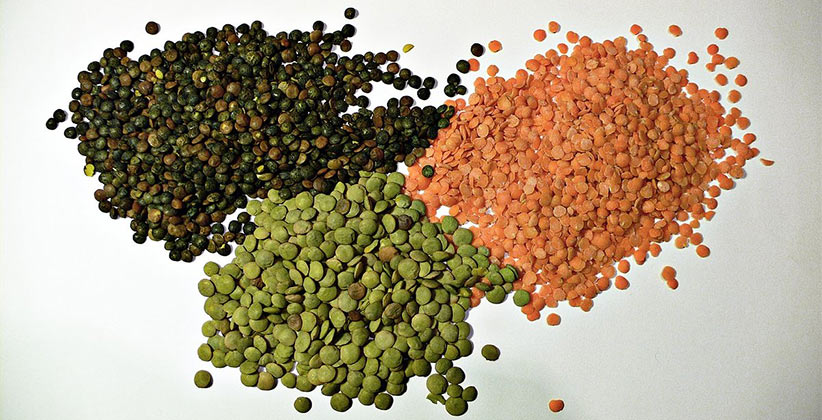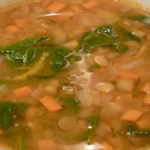 In order to have a rounded high protein, high fiber diet you should include several servings of lentils a week. Lentils are a pulse and member of the legume family of beans, and peas. Lentils come in a variety of colours but all are easy to prepare when compared to pulses likes beans that require several hours of soaking and cooking. Lentils are available in brown, green and black as well as gourmet lentils such as Beluga, which are reminiscent of caviar in appearance.
In order to have a rounded high protein, high fiber diet you should include several servings of lentils a week. Lentils are a pulse and member of the legume family of beans, and peas. Lentils come in a variety of colours but all are easy to prepare when compared to pulses likes beans that require several hours of soaking and cooking. Lentils are available in brown, green and black as well as gourmet lentils such as Beluga, which are reminiscent of caviar in appearance.
Lentil Facts
Folate for pregnancy
Lentils are an excellent natural source of folate, which is critical for prevention of birth defects. In addition, if lentils are eaten for a year prior to pregnancy they have been shown to reduce the chances of early delivery by up to 50%. One cup of lentils a day will provide a pregnant woman with up to 90% of the folic acid requirements needed for a healthy pregnancy.
Heart health
It is well known that increasing your fiber intake can reduce bad cholesterol and the fiber, protein, folic acid and potassium in lentils all support a heart healthy diet to reduce “bad” cholesterol or LDL.
Lentils are an essential source of important minerals, vitamins and fiber in your daily diet. In addition to the fact that they provide a fantastic source of protein which can replace expensive meats. This meat replacement strategy also reduces a major source of saturated and trans fats so your risk for heart disease is decreased even further.
Studies in the US have shown that less than 2% of the population meets the daily requirement of potassium and lentils are a fantastic source of this mineral naturally. Additionally, calcium and magnesium have been found to dramatically decrease blood pressure and lentils contain both these active minerals.
Cancer
Selenium is a critically important mineral that has been found to prevent inflammation, decrease tumor growth rates, and improve immune response to infection by stimulating production of the cancer destroying T-cells. Selenium also plays a role in liver enzyme function and helps detoxify some cancer-causing compounds in the body. Selenium is a mineral found naturally in lentils that is not present in most other foods. Of course, fiber is an all-important factor in lowering the risk of colorectal cancers.
Fatigue
Many women are afflicted with an iron deficiency, which causes the body to feel run down, and fatigued. Lentils are an excellent source of easily digested or ‘non-heme’ iron, which can reduce the symptoms of fatigue dramatically. A serving of lentils can give you over 1/3 of your iron needs a day in only one cup of cooked lentils.
Digestion
A high fiber diet is very important for whole body health, but in particular high fiber foods make you feel fuller and more satisfied after a meal. This helps in weight loss, and keeping the digestive system operating at peak efficiency. A healthy digestive tract makes you less prone to toxins building up in your system and also helps keep the gut and digestive systems clean and functioning.
Nutritional breakdown of lentils
One cup of cooked lentils contains:
- 230 calories
- 18 grams of protein
- 1 gram of fat
- 40 grams of carbohydrates (including 16 grams of fiber and 4 grams of sugar)
- That same 1-cup serving provides the following proportion of your daily intake:
- 90 % of folate
- 37 % of iron
- 49 % of manganese
- 36 %of phosphorus
- 22 % of thiamin
- 21 % of potassium
- 18 % of vitamin B6
Lentils are also a source of riboflavin, niacin, pantothenic acid, magnesium, zinc, copper, manganese, and selenium.
Lentils and your daily diet
Lentils are a great quick way to add all the benefits mentioned above into your daily diet. They do not require soaking and cook just as quickly (depending on the variety) as rice and other starches. Simply rinse your lentils (or use-canned products) and pick out any stones or damaged ones. Place a cup of lentils into a pot of water (3 cups of water) and bring to a boil. If you like, add in spices, herbs, garlic, curry powers, onion and stock to give the dish a deeper flavor. When the lentils are tender, strain and serve or get creative and add other ingredients to build yourself a salad or side dish to compliment whatever your main meal is.
Types of lentils and how to use
Brown lentils are the most common variety and can be found in virtually every grocery or specialty store. They are the least expensive and they soften quite a bit on cooking but are perfect for adding to soups, stews and casseroles and work beautifully well in a slow cooker.
Green/French Lentils, which are grown in N.America, are slightly more expensive but they have a slightly nuttier flavor. These stay a little firmer than the brown lentils and are wonderful in salads or pilafs.
Puy Lentils are the original French lentils and are only grown in a certain region of France so they are allowed to be called Puy. These are a smaller greenish gray lentil that holds up well to cooking and they do well in both salads and cassoulets. They are also very good when served as a side instead of rice, pasta or a starch.
Red lentils are very mild and cook down to a creamy soft consistency. Used mainly in Indian dishes like dals or puris these lentils have a lovely almost sweetish flavour.
Beluga lentils are called because they look like the caviar are a smaller, firmer lentil that needs slightly less cooking than other types of lentils. They will stay firmer and make a beautiful salad presentation and they have a peppery flavor that goes well with most other ingredients.
Lentil Tips
Keep a couple of cans of lentils in your cupboard and add them to soups, soups, crock-pot or slow cooker dishes.
In recipes that call for beans reduce the beans called for by half and add the balance in cooked or canned lentils.
You can make a great dip by mashing cooked lentils with garlic, good olive oil, and lemon juice. Change it up with some tomatoes, cumin and chilies to add a spicier flavor and serve with some of the new lentil crackers that are available in supermarkets.
If you need more information about lentils, grain or pulses or you are looking for a Canadian lentil exporter, give us a call at +1 (416) 548-5901 today!
Extracted from: http://www.medicalnewstoday.com/articles/297638.php




Comments are closed.